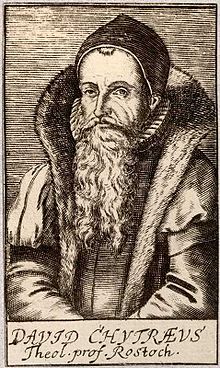
Back ديڤيد تشيترايوس ARZ David Chyträus Danish David Chyträus German David Chytraeus Esperanto David Chyträus Finnish David Chytraeus French David Chytraeus Latin David Chyträus Polish David Chyträus Portuguese David Chytraeus Swedish
You can help expand this article with text translated from the corresponding article in German. (April 2024) Click [show] for important translation instructions.
|
This article includes a list of general references, but it lacks sufficient corresponding inline citations. (May 2014) |

David Chytraeus or Chyträus (26 February 1530 – 25 June 1600) was a German Lutheran theologian, reformer and historian. He was a disciple of Philip Melancthon.
He was born at Ingelfingen. His real surname was Kochhafe, which in Classical Greek is χύτρα, from where he derived the Latinized pseudonym "Chyträus".
Chytraeus was professor of the University of Rostock and one of the co-authors of the Formula of Concord. He is known for his work as the author of a Protestant catechism. His original Latin text was published in 1554, then reprinted in 1599. Now it has been translated for the first time in German. It has been published, together with editorial notes and commentary by Michael.[1]
The Protestant estates of Lower Austria, in the person of Leopold Grabner zu Rosenburg, Rüdiger von Starhemberg and Wolf Christoph von Enzersdorf, invited Chytraeus in 1568 at the instigation of Emperor Maximilian II so that he could work out a church order and an agenda for them.[2][3]
He is the author of a treatise on music, De Musica,[4] and a theological treatise, De Sacrificiis.[5]
In August 1598, a Scottish diplomat, Peter Young came to Rostock and discussed objections raised by James VI to Chytraeus's writings concerning Mary, Queen of Scots. Chytraeus is said to have sent an amended version.[6]
David Chytraeus died in Rostock, aged 70.
- ^ Michael, Susi-Hilde. 2016. Der Katechismus des David Chytraeus. Evangelische Verlagsanstalt.
- ^ Pfarrgeschichte von Pottenbrunn, von Josef Buchinger (1936). Kapitel: Schloss Pottenbrunn mit Unterkapitel: 5. Das Geschlecht der Grabner in Pottenbrunn, p 215 (Pfarramt Pottenbrunn)
- ^ Franz Karl Wißgrill: Schauplatz des landsässigen Nieder-Oesterreichischen Adels vom …. Band 3, p 370 (books.google.at).
- ^ Joachim Burmeister, Poétique musicale. Suivi de David Chytraeus – De la Musique, translation, introduction, notes and lexicon by Agathe Sueur and Pascal Dubreuil, Rhuthmos, 2017.
- ^ Chytraeus on Sacrifice: A Reformation Treatise in Biblical Theology. David Chytraeus' De Sacrificiis of 1569 Translated by John Warwick Montgomery. St. Louis, Missouri: Concordia Publishing House, 1962.
- ^ Michael Pearce, "Riddle's Court, Banquet and Diplomacy in 1598", History Scotland, 12:4 (July/August 2012), p. 25.